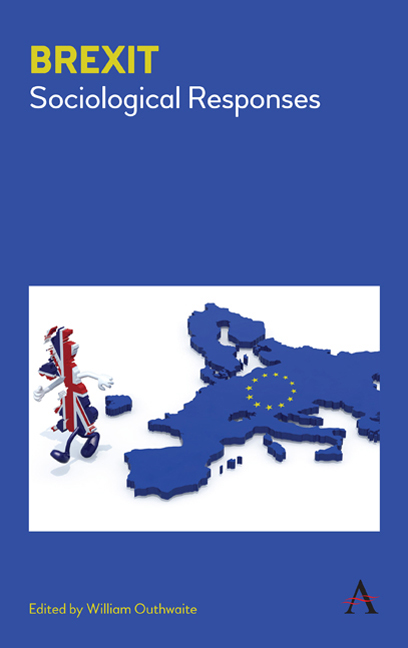Book contents
- Frontmatter
- Contents
- Preface
- Section 1 HOW DID IT HAPPEN?
- Section 2 THE POLITICS OF BREXIT
- Section 3 PROSPECTS FOR/ AFTER BREXIT
- Chapter Ten The EU and Brexit: Processes, Perspectives and Prospects
- Chapter Eleven The Impossibility of Disentangling Integration
- Chapter Twelve No Exit from Brexit?
- Chapter Thirteen Critical Theory, Brexit and the Vicissitudes of Political Economy in the Twenty- First Century
- Chapter Fourteen European Union versus European Society: Sociologists on ‘Brexit’ and the ‘Failure’ of Europeanization
- Notes on Contributors
- Index
Chapter Eleven - The Impossibility of Disentangling Integration
from Section 3 - PROSPECTS FOR/ AFTER BREXIT
Published online by Cambridge University Press: 10 January 2018
- Frontmatter
- Contents
- Preface
- Section 1 HOW DID IT HAPPEN?
- Section 2 THE POLITICS OF BREXIT
- Section 3 PROSPECTS FOR/ AFTER BREXIT
- Chapter Ten The EU and Brexit: Processes, Perspectives and Prospects
- Chapter Eleven The Impossibility of Disentangling Integration
- Chapter Twelve No Exit from Brexit?
- Chapter Thirteen Critical Theory, Brexit and the Vicissitudes of Political Economy in the Twenty- First Century
- Chapter Fourteen European Union versus European Society: Sociologists on ‘Brexit’ and the ‘Failure’ of Europeanization
- Notes on Contributors
- Index
Summary
We make this report for debate.
– House of Lords (2016, p. 3; emphasis in original text)Introduction
This chapter offers an analysis of the mid- to long- term effect of the Brexit referendum from the perspective of norms research in international relations theory and recognition theory. To that end, it focuses on key contestations about fundamental norms that have been at the centre of the debate following the referendum vote on 23 June 2016, namely, fundamental human rights and sovereignty. It suggests that the contestations are indicators for potential mid- to long- term effects that the manifold debates about the referendum had on normative change both in the UK and, relatedly, in the European Union (EU). Contestations are defined as objections to norms. They are crucial for a society's normative structure of meaning. Contestations effectively mean the practices of ‘re- enacting normative meaning in use’ (Milliken 1999): 132). Contestations obtain such a central role for politics because they are conducted by a diversity of involved stakeholders (that is, ranging from individual voters to government representatives) and therefore reveal the individual normative positions of individuals. As such, contestations are both indicative of the robustness of norms (i.e. reactive contestation) and constitutive for the revision of norms (i.e. proactive contestation). The argument developed in the present chapter maintains that the referendum debate is therefore a welcome opportunity to recall where British and European stakeholders stand on fundamental norms. Two norms stand out in the debate between the vote- leave campaign and the vote- remain campaign (hereafter: leavers versus remainers): the fundamental right of freedom of movement and sovereignty in Parliament. The former represents one of the four freedoms of the EU; the latter is the principal right of democracy in Britain. The chapter presents the argument about contestation and normative change and the related effects in three steps: step one presents the politico- legal and societal context of the UK within the EU, taking into account the four decades of European integration that the UK has shared with the other EU member states. Step two zooms in on the current scenario of fundamental norms in crisis, with reference to two fundamental norm contestations in the UK.
- Type
- Chapter
- Information
- BrexitSociological Responses, pp. 139 - 152Publisher: Anthem PressPrint publication year: 2017

